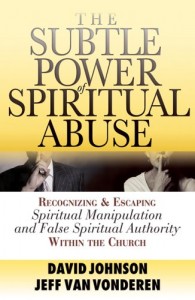 The Subtle Power of Spiritual Abuse, Chapter 2: Spiritual Abuse Is Not New
The Subtle Power of Spiritual Abuse, Chapter 2: Spiritual Abuse Is Not New
We continue our Thursday series blogging through “The Subtle Power of Spiritual Abuse.” The first post in the series is here.
Are the spiritual relationships you have bringing the rest Jesus promised or do you find just more toil and weariness? (p. 29)
Jesus said, “Come to me, all who are weary and heavy-laden, and I will give you rest. Take My yoke upon you, and learn from Me, for I am gentle and humble in heart; and you shall find rest for your souls. For My yoke is easy, and My load is light.” (Matthew 11:28-30)
Spiritual leaders who drive people to perform are not new. In the Old Testament, Jeremiah spoke out against leaders who took care of themselves while misleading the people under them. As the authors of this book often point out, there is a difference between real authority and perceived authority (they will also call this “power-posturing” later in the book).
Jesus described the people as distressed and downcast. He offered them rest:
Jesus said that the religious leaders of his day were laying heavy loads on the backs of others while standing back and not lifting a finger to help. He called them a “brood of vipers” and “ravenous wolves.” The authors provide a sad, but fascinating image of how a brood of vipers would turn a seemingly safe place into an unsafe place. The “ravenous wolves” are chilling; they are shepherds who lead entire flocks astray.
Paul spoke against spiritually abusive leaders. He referred to them as “the circumcision,” Judaizers, dogs, evil workers, and false brethren. He came on particularly strong against the Judaizers in Galatians. It seems they were adding spiritual performance on top of faith in Jesus to truly gain positive standing in God’s eyes. This is the weight of legalism.
Those who accept Jesus-only as the route to life and God’s approval are a living confrontation to those who seek God’s approval based on behavior. The legalists are not able to keep the Law themselves, but they lay it on those under them so that they might avoid scrutiny themselves and boast about the number of those who follow their leadership. This connects back to the spiritually abusive dynamic in chapter 1, where religious leaders are using those under them to meet their own needs. “And it’s all cloaked in the language of being holy and helping others to live holy lives.” (p. 37)
Paul warned Timothy about those leaders who acted godly not because they were godly, but to gain something. They saw being godly as an instrument to personal gain. Godliness plus contentment is in fact great gain, Paul wrote, but godliness is not a tool to be used to acquire gain. Contentment does not come to legalists. A contented legalist is an oxymoron!
Paul wrote to Titus concerning “those of the circumcision who must be silenced because they are upsetting whole families.”
Coming specifically from an ATI perspective, I was reminded of how some people defend Bill Gothard when he does not live up to his own standards. It is sometimes said that since he is an “exhorter” he will urge others on to standards which he himself is unwilling or unable to keep. To me, this sounds similar to “those who are circumcised” and “desire to have you circumcised” but who “do not even keep the Law themselves.”
Questions for discussion:
Note: please feel free to comment about these questions or anything else that stands out to you about this chapter.
How is the rest that Jesus promised different from legalistic systems that drive their followers on to even more performance?
Have you experienced this rest?
Do you think the term “spiritual abuse” is warranted? Do you find the term too strong in comparison with other kinds of abuse (physical, emotional, sexual)?
Good quotes:
Spiritual abuse puts people at odds with their best Friend. It causes some people to question, doubt, and even run the other direction from their Source. (p. 29)
Jesus plus anything is not Jesus! (p. 35)
Therefore, a spiritual system to be avoided is one in which the leaders or teachers add the performance of religious behaviors to the performance of Jesus on the cross as the means to find God’s approval. (p. 36)
It’s not wrong to notice legalism… Noticing legalism does not make you the problem. (p. 39)
(Click here to go on to Chapter 3)






















[...] (Click here to go on to Chapter 2) All articles on this site reflect the views of the author(s) and do not necessarily reflect the views of other Recovering Grace contributors or the leadership of the site. Students who have survived Gothardism tend to end up at a wide variety of places on the spiritual and theological spectrum, thus the diversity of opinions expressed on this website reflects that. For our official statement of beliefs, click here. Featured ArticleRG Book Club guilt spiritual abuse The subtle power of spiritual abuse [...]
[...] A glimpse into the chapters of The Subtle Power of an Abusive Church online [...]
[…] A glimpse into the chapters of The Subtle Power of an Abusive Church online […]